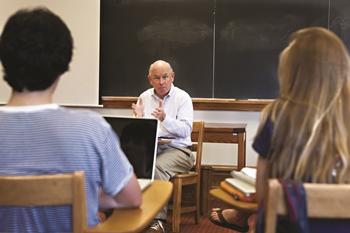Brave Thinking Animates Class

Of the class and its well-read blog, Bradley Chair holder P.J. Crowley notes, "I'm enjoying the interaction. It's a high-level conversation."
Campus News
by Sherri Kimmel
He’s hot, he’s dangerous, and he’s dead. And the legitimacy of his demise is the driving topic one October day in Denny Hall, Room 203.
He is Anwar al-Awlaki, an American citizen who’d become a terrorist and was killed in Yemen in September without benefit of trial. The class is National Security Policy in the 21st-century Global Media Environment. And the professor is P.J. Crowley, former assistant secretary of state for public affairs and the 10th holder of the General Omar N. Bradley Chair in Strategic Leadership, a one-year appointment jointly sponsored by Dickinson, the U.S. Army War College and the Penn State Dickinson School of Law and School of International Affairs.
Though the main focus of the Oct. 10 class is President Obama’s national security policy, the ghost of Anwar al-Awlaki flits in and out of the three-hour block.
At the top of the hour, Crowley asks the students if it was OK to use drones to assassinate the al-Quaida operative. Many already had devoured a New York Times scoop about a secret government memo that justified the al-Awlaki killing. Most students say they approve of the action. “Does the fact that a covert action was against one of your own people change the equation?” Crowley probes.
Political-science major Alex Toole ’14 offers, “I’m just glad we’re safe from another member of al-Quaida.”
Crowley lobs more provocative questions. “Who is troubled by a missile strike against a U.S. citizen without due process? Does government need to tell the American people its rationale? What does an accountable government mean to you?”
Then, with a twinkle in his eye, he says, “Just to clarify, I think it was a good strike.” He lofts two thumbs up.
After listening to Toole and Andres Israel ’12 present an analysis of President Obama’s June 2009 Cairo speech, the al-Awlaki killing re-emerges. “Would you rather kill [terrorists] than torture them?” Crowley asks.
“Yes, it’s cleaner,” says Will Nelligan ’14, a double major in history and political science. “Shoot first, ask questions later.” Another student interjects, “I have to agree.”
“Wow, this is a tough crowd,” Crowley marvels. “What is more consistent with our values?” The students continue the debate.
The next day, Crowley assesses the class: “I was pleasantly surprised that they are willing to invest in government as opposed to seeing it as the enemy. But by the same token, you’ve gotta push government to be more forthcoming. In the past 10 years, for understandable reasons, we’ve pulled back a lot of information that used to be in the public sphere—under the moniker of security. But we just took out an American citizen with a deliberative process not due process. We have to be careful of the ramifications.”
These thorny dilemmas light up the eyes of this man who’s entering his third career—college professor. He was an Air Force colonel, then state department spokesman, before abruptly resigning in March after publicly decrying the Pentagon’s treatment of Army Pvt. Bradley Manning, who allegedly funneled classified government information to WikiLeaks.org.
Crowley stood by his comments, which he later learned had angered the White House. His bold action won him inclusion this fall in The Atlantic’s Brave Thinkers 2011, a guide to people who’ve risked their reputations, fortunes and lives in pursuit of big ideas. It’s also made him a popular political analyst for the BBC and Al-Jazeera English and commentator for The Daily Beast.
Meanwhile, a few days after the once-a-week class, Nelligan and Toole pause at the corner of Louther and College streets to discuss Monday’s session. “I like classes where we talk about current events and set up a context with historical events but then take the whole global-media exposure in the last 10 years into account,” Toole opines. “I like the flow of the conversation. And our class blog allows us to extend the conversation.”
Toole is referring to the Carlisle Policy Forum, which Crowley initiated this fall. Toole remarks on the activity sparked by the class discussion of the al-Awlaki assassination and his and Nelligan’s blog comments.
Nelligan tweeted his comments to Anne-Marie Slaughter, a former state department colleague of Crowley’s. She wrote back, “interesting analysis,” then tweeted it to her 16,000 followers. “There were 200 hits in a minute on our blog,” says Nelligan. He was further energized when he discovered the prime minister of Lebanon had followed him on Twitter and that the political magazine, The Week, had posted his analysis alongside a comment on al-Awlaki that had originated in The New York Review of Books.
While there are several campus leaders among the dozen students, who are mainly political-science and international-studies majors, not all are die-hard politicos—yet. One outcome of the dynamic class, predicts Toole: “Students will become political junkies if they aren’t already.”
Read the National Security Policy in the 21st-century Global Media Environment class blog.
Published January 2, 2012